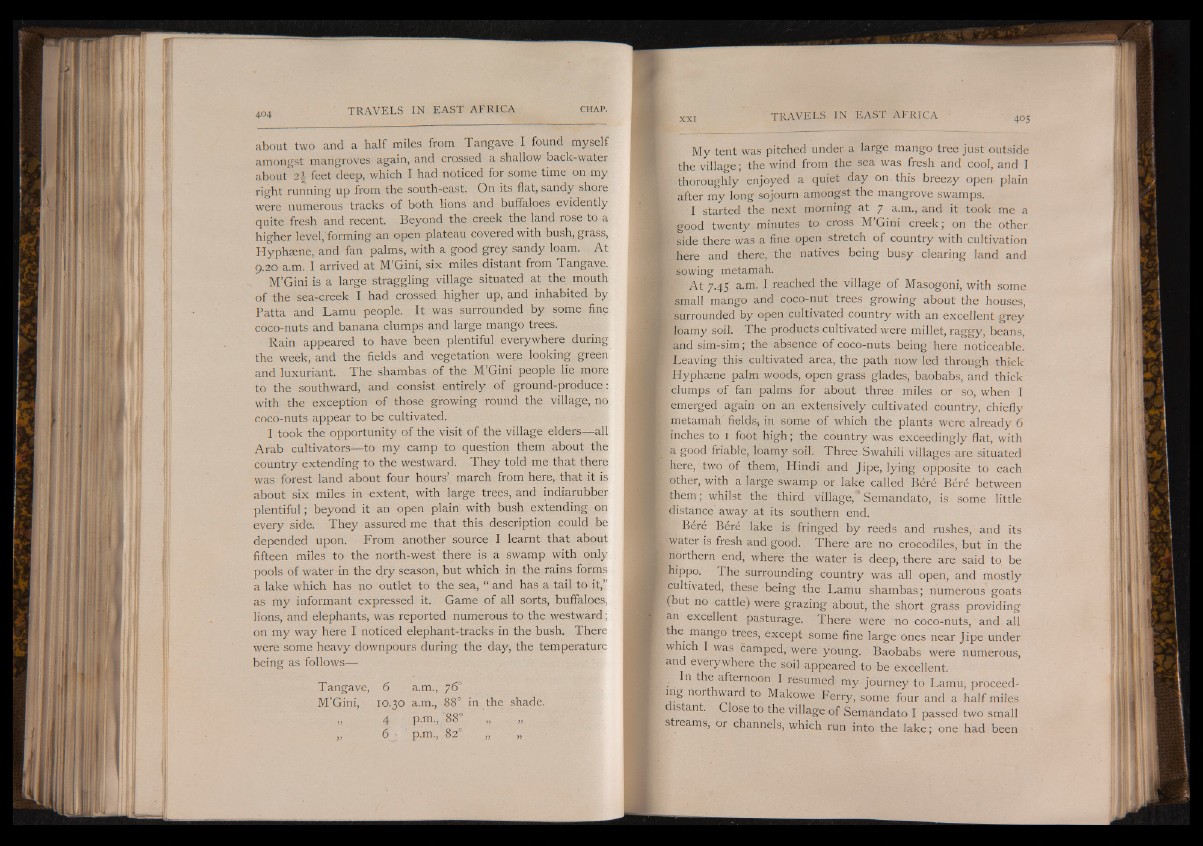
about two and a half miles from Tangave I found myself
amongst mangroves again, and crossed a shallow back-water
about 2-1 feet deep, which I had noticed for some time on my
right running up from the south-east. On its flat, sandy shore
were numerous tracks of both lions and buffaloes evidently
quite fresh and recent. Beyond the creek the land rose to a
Higher level, forming an open plateau covered with bush, grass,
Hyphmne, and fan palms, with a good grey sandy loam. At
9.20 a.m. I arrived at M’Gini, six miles distant from Tangave.
M’Gini is a large straggling village situated at the mouth
of the sea-creek I had crossed higher up, and inhabited by
Patta and Lamu people. It was surrounded by some fine
coco-nuts and banana clumps and large mango trees.
Rain appeared to have been plentiful everywhere during
the week, and the fields and vegetation were looking green
and luxuriant. The shambas of the M’Gini people lie more
to the southward, and consist entirely of ground-produce:
with the exception of those growing round the village, no
coco-nuts appear to be cultivated.
I took the opportunity of the visit of the village elders—-all
Arab cultivators— to my camp to question them about the
country extending to the westward. They told me that there
was forest land about four hours’ march from here, that it is
about six miles in extent, with large trees, and indiarubber
plentiful; beyond it an open plain with bush extending on
every side. They assured me that this description could be
depended upon. From another source I learnt that about
fifteen miles to the north-west there is a swamp with only
pools of water in the dry season, but which in the rains forms
a lake which has po outlet to the sea, “ and has a tail to it,”
as my informant expressed it. Game of all sorts, buffaloes,
lions, and elephants, was reported numerous to the westward;
on my way here I noticed elephant-tracks in the bush. There
were some heavy downpours during the day, the temperature
being as follows—
Tangave, 6 a.m., y6°
M’Gini, 10.30 a.m., 88° in the shade.
„ 4 p.m., '88° „
„ 6 i ' p.m., 82° „ „
My tent was pitched under a large mango tree just outside
■ the village ; the wind from the sea was fresh and cool, and I
thoroughly enjoyed a quiet day on this breezy open- plain
after my long sojourn amongst the mangrove swamps.
I started the next morning at 7 a.m., and it took me a
i good twenty minutes to cross M’Gini creek; on the other
I side there was a fine open stretch of country with cultivation
here and there, the natives being busy clearing land and
I sowing metamah.
At 7.45 a.m. I reached the village of Masogoni, with some
I small mango and coco-nut trees growing about the houses,
I surrounded by open cultivated country with an excellent grey
I loamy soil. The products cultivated were millet, raggy, beans,
! and sim-sim ; the absence of coco-nuts being here noticeable,
i Leaving this cultivated area, the path now led through thick
Hyphaene palm woods, open grass glades, baobabs, and thick
I clumps of fan palms for about three miles or so, when I
I emerged again on an extensively cultivated country, chiefly
metamah fields, in some of which the plants were already 6
¡inches to 1 foot high; the country was exceedingly flat, with
a good friable, loamy soil. Three Swahili villages are situated
here, two of them, Hindi and Jipe, lying opposite to each
other, with a large swamp or lake called Béré Béré between
them; whilst the third village,*Semandato, is some little
distance'away at its southern end.
v Beré Bére lake is fringed by reeds and rushes, and its
water is fresh and good. There are no crocodiles, but in the
northern end, where the water is deep, there are said to be
¡¡hippo. The surrounding country was all open, and mostly
¡cultivated, these being the Lamu shambas; numerous goats
-(but no cattle) were grazing about, the short grass providing
an excellent pasturage. There were no coco-nuts, and all
the mango trees, except some fine large ones near Jipe under
w ich I was camped, were young. Baobabs were numerous,
and everywhere the soil appeared to be excellent.
^ n the afternoon I resumed my journey to Lamu, proceeding
northward to Makowe Ferry, some four and a half miles
distant. Close to the village of Semandato I passed two small
streams, or channels, which run into the lake; one had been